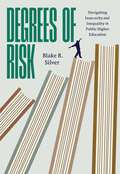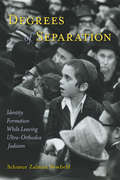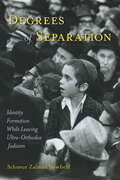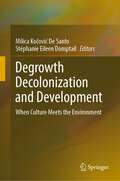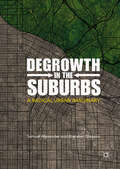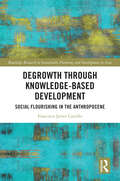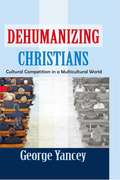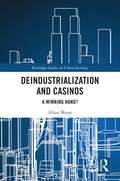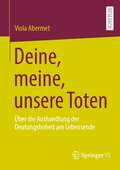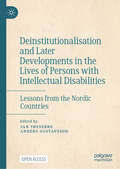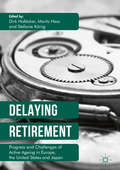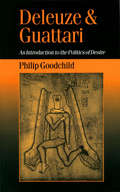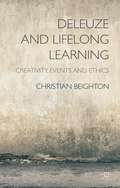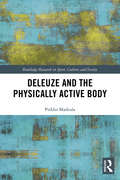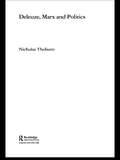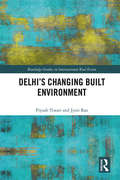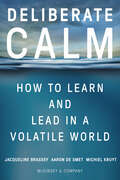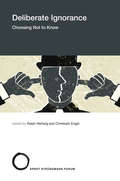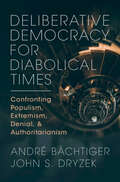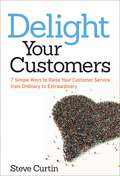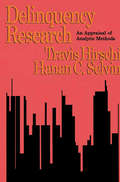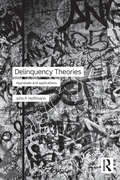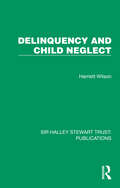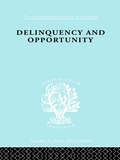- Table View
- List View
Degrees of Risk: Navigating Insecurity and Inequality in Public Higher Education
by Blake R. SilverAn ethnographic analysis of how insecurity is at the heart of contemporary higher education. Institutions of higher education are often described as “ivory towers,” places of privilege where students exist in a “campus bubble,” insulated from the trials of the outside world. These metaphors reveal a widespread belief that college provides young people with stability and keeps insecurity at bay. But for many students, that’s simply not the case. Degrees of Risk reveals how insecurity permeates every facet of college life for students at public universities. Sociologist Blake Silver dissects how these institutions play a direct role in perpetuating uncertainty, instability, individualism, and anxiety about the future. Silver examined interviews with more than one hundred students who described the risks that surrounded every decision: which major to choose, whether to take online classes, and how to find funding. He expertly identified the ways the college experience played out differently for students from different backgrounds. For students from financially secure families with knowledge of how college works, all the choices and flexibility of college felt like an adventure or a wealth of opportunities. But for many others, especially low-income, first-generation students, their personal and family circumstances meant that that flexibility felt like murkiness and precarity. In addition, he discovered that students managed insecurity in very different ways, intensifying inequality at the intersections of socioeconomic status, race, gender, and other sociodemographic dimensions. Drawing from these firsthand accounts, Degrees of Risk presents a model for a better university, one that fosters success and confidence for a diverse range of students.
Degrees of Separation: Identity Formation While Leaving Ultra-Orthodox Judaism
by Schneur Zalman NewfieldThose who exit a religion—particularly one they were born and raised in—often find themselves at sea in their efforts to transition to life beyond their community. In Degrees of Separation, Schneur Zalman Newfield, who went through this process himself, interviews seventy-four Lubavitch and Satmar ultra-Orthodox Hasidic Jews who left their communities.He presents their motivations for leaving as well as how they make sense of their experiences and their processes of exiting, detailing their attitudes and opinions regarding their religious upbringing. Newfield also examines how these exiters forge new ways of being that their upbringing had not prepared them for, while also considering what these particular individuals lose and retain in the exit process. Degrees of Separation presents a comprehensive portrait of the prolonged state of being “in-between” that characterizes transition out of a totalizing worldview. What Newfield discovers is that exiters experience both a sense of independence and a persistent connection; they are not completely dislocated from their roots once they “arrive” at their new destination. Moreover, Degrees of Separation shows that this process of transitioning identity has implications beyond religion.
Degrees of Separation: Identity Formation While Leaving Ultra-Orthodox Judaism
by Schneur Zalman NewfieldThose who exit a religion—particularly one they were born and raised in—often find themselves at sea in their efforts to transition to life beyond their community. In Degrees of Separation, Schneur Zalman Newfield, who went through this process himself, interviews seventy-four Lubavitch and Satmar ultra-Orthodox Hasidic Jews who left their communities.He presents their motivations for leaving as well as how they make sense of their experiences and their processes of exiting, detailing their attitudes and opinions regarding their religious upbringing. Newfield also examines how these exiters forge new ways of being that their upbringing had not prepared them for, while also considering what these particular individuals lose and retain in the exit process. Degrees of Separation presents a comprehensive portrait of the prolonged state of being “in-between” that characterizes transition out of a totalizing worldview. What Newfield discovers is that exiters experience both a sense of independence and a persistent connection; they are not completely dislocated from their roots once they “arrive” at their new destination. Moreover, Degrees of Separation shows that this process of transitioning identity has implications beyond religion.
Degrowth Decolonization and Development: When Culture Meets the Environment
by Milica Kočović De Santo Stéphanie Eileen DomptailDegrowth Decolonization and Development reveals common underlying cultural roots to the multiple current crises. It shows that culture is an essential sphere to initiate fundamental changes and solutions as it brings about transformative imaginaries on a theoretical, political and practical level. The book focusses on the interplay between culture and the environment, society and the economy. It provides a critique of concepts associated with the term “Development” and reveals knowledge and theories outside the comfort zone of the mainstream Western theoretical landscape, which will certainly be instrumental in the decolonization of both development theories and practices. The book convincingly reveals the large array of domains, which, when interpreted from a decolonization and Degrowth perspective, can be managed through logics of environmental justice, social equity and equality, and generate societally more desirable outcomes. The book presents a multidisciplinary perspective on the contemporary global crises and features interdisciplinary analyses thereof through the lenses of cultural studies, critical development studies, political economy, eco-feminist political ecology, anthropology and sociology. Degrowth Decolonization and Development unveils the fundamental role of the dichotomies characterizing the Western modern development paradigm in shaping today’s actions, and especially the dichotomies of Global North and Global South, Centre and Periphery, Developed and Developing/Underdeveloped, Man and Nature. Degrowth Decolonization and Development addresses all researchers and activists interested in sustainability transformation and decolonization processes in Development studies. Degrowth Decolonization and Development is structured as a collection of seven original case studies. These are authored by researchers who met when presenting their work in Decolonization and Degrowth panels from the ISEE-ESEE-Degrowth Conference, Manchester, July 5-8, 2021, and the 8th International Degrowth Conference in The Hague, Netherlands, August 24-28, 2021. The concluding chapter proposes a synthesis identifying key concepts and steps in cultural change for the decolonization of the Western worldview towards “pluriverse” alternatives. The book traces future imaginaries for modelling future new systemic solutions and a needed radical change.
Degrowth in the Suburbs: A Radical Urban Imaginary
by Samuel Alexander Brendan GleesonThis book addresses a central dilemma of the urban age: how to make the vast suburban landscapes that ring the globe safe and sustainable in the face of planetary ecological crisis. The authors argue that degrowth, a planned contraction of economic overshoot, is the only feasible principle for suburban renewal. They depart from the anti-suburban sentiment of much environmentalism to show that existing suburbia can be the centre-ground of transition to a new social dispensation based on the principle of self-limitation. The book offers a radical new urban imaginary, that of degrowth suburbia, which can arise Phoenix like from the increasingly stressed cities of the affluent Global North and guide urbanisation in a world at risk. This means dispensing with much contemporary green thinking, including blind faith in electric vehicles and high-density urbanism, and accepting the inevitability and the benefits of planned energy descent. A radical but necessary vision for the times.
Degrowth through Knowledge-Based Development: Social Flourishing in the Anthropocene (Routledge Research in Sustainable Planning and Development in Asia)
by Francisco Javier CarrilloThis book tackles the terms under which a knowledge-based society can indefinitely improve while pursuing an eco-economic steady state. In doing so, it addresses the literature gap on continued social improvement within a post-growth economic and cultural paradigm.Carrillo consolidates research on the Degrowth paradigm and proposes a conceptual framework for continued social improvement based on the integration of tangible and intangible collective values. He proposes a method that accounts for effective social value through capital systems valuation and development and includes this operational metric system as an alternative to the metric of Gross National Product (GNP). The book critically examines the challenges of identifying a complete and consistent representation of total social value. The book also includes a series of knowledge-based development programmes in cities and regions around the world and discusses policies and practices for urban mitigation and adaptation to the Anthropocene.This transdisciplinary book will be of particular interest to researchers of degrowth economics, sustainable development, and urban planning.
Dehumanizing Christians: Cultural Competition in a Multicultural World
by George YanceyRight-wing authoritarianism has emerged as a social psychological theory to explain conservative political and religious movements. Such authoritarianism is said to be rooted in the willingness of individuals to support authority figures who seek to restrict civil and human rights. George Yancey investigates the effectiveness of right-wing authoritarianism and the social phenomenon it represents. He analyzes how authoritarians on both the right and the left sides of the sociopolitical spectrum dehumanize their opponents.
Deindustrialization and Casinos: A Winning Hand? (Routledge Studies in Urban Sociology)
by Alissa MazarAs governments increasingly legalize and expand the availability of casinos, hoping to offset the impacts of manufacturing decline through the advancement of gambling commerce, this book examines what casinos do—and do not do—for host communities in terms of economic growth. Examining the case generally made by those seeking to establish casino developments—that they offer benefits for the "public good"—the author draws on a case study of Canada’s automotive capital (Windsor, Ontario), which was a pilot site for potential further casino development in the region. The author asks whether casinos do, in fact, offer good jobs, revenue generation, and economic diversification. A study of the benefits of casino developments that considers the question of whether they constitute a ready answer to the problems of industrial and economic decline, this volume will appeal to scholars of sociology and urban studies, with interests in the gambling industry, economic sociology, the sociology of work, and urban regeneration.
Deine, meine, unsere Toten: Über die Aushandlung der Deutungshoheit am Lebensende
by Viola AbermetIn der modernen Dienstleistungsgesellschaft werden spezielle wie alltägliche Aufgaben in die Hände von Dienstleistenden übergeben. Gerade im Bereich des Sterbens entsteht die Herausforderung, eine besonders emotionale und sensible Arbeit verrichten zu müssen, in einem der letzten Bereiche, die noch stark mit Familie assoziiert werden. So schließt sich die Frage an, wie dem Übel der Kommodifizierung des Sterbens in der Praxis begegnet wird: Wer darf wie über Tod und Sterben entscheiden? In teilnehmender Beobachtung im Pflegeheim, Hospiz, Bestattungswesen, Friedhof, Krematorium und Palliative Care Team wird der Frage nachgegangen, wie am Lebensende im Beziehungskomplex von Dienstleistenden, Sterbenden und Angehörigen die Deutungshoheit des angemessenen Sterbens ausgehandelt wird. Zu sehen ist ein pragmatisches Spiel mit Elementen der Fürsorge- und Dienstleistungswelten, das ein komplexes und dynamisches Beziehungsgefüge wechselseitiger Dependenzen entstehen lässt.
Deinstitutionalisation and Later Developments in the Lives of Persons with Intellectual Disabilities: Lessons from the Nordic Countries
by Jan Tøssebro Anders GustavssonThis open access book offers a comprehensive review of the deinstitutionalisation process in the Nordic countries and its long-term developments from 1960 to 2020. Challenging the popular idea of deinstitutionalisation as a &“mission accomplished&” in this region, it heralds discussion about how the relocation process has unfolded and what consequences it has had for people with intellectual disabilities in practice. It presents a compelling narrative of the history and the current status of services for people who moved out of institutions to live in the community and discusses to what extent the intentions have been achieved. Retracing the conceptualisation of normalisation in the 1960s and the new wave of deinstitutionalisation in Norway and Sweden in the 1980s and 1990s, this collection discusses how dismantling of institutions came to the forefront of the political agenda. It scrutinises the drivers of change in policies and practices for persons with intellectual disabilities, exploring changing ideologies, political goals, and service developments in the context of more general policy developments in the Nordic region. Leading experts in the field unveil the complex dynamics between ideologies, policies, practices, and contexts to challenge and reconsider lessons learned in the past fifty years from the Nordic experience. A &‘must read&’ for students and researchers interested in disability studies, intellectual disability, social policy, social work, special care nursing, rehabilitation, as well as professionals, policymakers and stakeholders.
Delaying Retirement: Progress and Challenges of Active Ageing in Europe, the United States and Japan
by Dirk Hofäcker, Moritz Hess and Stefanie KönigTo a backdrop of ageing societies, pension crises and labour market reforms, this book investigates how the policy shift from early retirement to active ageing has affected individual retirement behaviour. Focusing on eleven European countries, the United States and Japan, it brings together leading international experts to analyze recent changes in pension systems. Their findings demonstrate that there has been a fundamental transition in pension policies and a steep increase in older workers’ retirement ages and employment rates. Yet changes in retirement behavior are not evenly distributed across all societal strata. This raises the serious concern that an overall rise in the retirement age will be accompanied by the re-emergence of social inequality in the transition from work to retirement. This innovative edited collection will appeal to students and scholars of sociology, economics, political science, human resources management, gerontology and social policy, and also to policy-makers and professionals dealing with older workers.
Deleuze and Guattari's Anti-Oedipus: Introduction to Schizoanalysis
by Eugene W. HollandEugene W. Holland provides an excellent introduction to Gilles Deleuze and Felix Guattari's Anti-Oedipus which is widely recognized as one of the most influential texts in philosophy to have appeared in the last thirty years. He lucidly presents the theoretical concerns behind Anti-Oedipus and explores with clarity the diverse influences of Marx, Freud, Nietzsche and Kant on the development of Deleuze & Guattari's thinking. He also examines the wider implications of their work in revitalizing Marxism, environmentalism, feminism and cultural studies.
Deleuze and Guattari: An Introduction to the Politics of Desire (Published in association with Theory, Culture & Society #44)
by Dr Philip GoodchildThis accessible book examines critically the writings of Deleuze and Guattari, clarifying the ideas of these two notoriously difficult thinkers without over-simplifying them. Divided into three sections - Knowledge, Power, and Liberation of Desire - the book provides a systematic account of the intellectual context as well as an exhaustive analysis of the key themes informing Deleuze and Guattari's work. It provides the framework for reading the important and influential study Capitalism and Schizophrenia and, with the needs of students in mind, explains the key concepts in Deleuze and Guattari's discussion of philosophy, art and politics. Definitive and incisive, the book will be invaluable in situating the philosophy of these two major figures within the perspective of the social and human sciences.
Deleuze and Lifelong Learning
by Christian BeightonThis book examines Gilles Deleuze's ideas about creativity in the context of lifelong learning, offering an original take on this important contemporary topic using cinematic parallels. Discussing Deleuze's difficult notion of 'counter-actualization' as a form of creative practice, it draws practical consequences for those across a diverse sector.
Deleuze and the Physically Active Body (Routledge Research in Sport, Culture and Society)
by Pirkko MarkulaThis volume examines Gilles Deleuze’s philosophy as it relates to the study of the physically active body. It explores theoretical and practical examples of how the physically active body can be examined as a material, social, political, and cultural entity using a Deleuzian perspective. Examining topics such as, the formation of thought within a capitalist system; sport, exercise, and dance as cultural arrangements; researching the physically active body from a Deleuzian perspective; and Deleuze on Foucault, this book shows ways of investigating the moving body as an agent for initiating social change. This is fascinating reading for students and researchers working in the fields of the Sociology of Sport, Sport and Politics, and Sport and Social Theory.
Deleuze, Marx and Politics (Routledge Studies in Social and Political Thought #Vol. 38)
by Nicholas ThoburnA critical and provocative exploration of the political, conceptual and cultural points of resonance between Deleuze's minor politics and Marx's critique of capitalist dynamics, engaging with Deleuze's missing work, The Grandeur of Marx. This book explores the core categories of communism and capital in conjunction with a wealth of contemporary and historical political concepts and movements - from the lumpenproletariat and anarchism, to Italian autonomia and Antonio Negri, immaterial labour and the refusal of work. This book will serve as an introduction to Deleuze's politics and the contemporary vitality of Marx for students and will challenge scholars in the fields of social and political theory, sociology and cultural studies.
Delhi's Changing Built Environment (Routledge Studies in International Real Estate)
by Piyush Tiwari Jyoti RaoThe rapid expansion, urban form and development of the built environment in the world’s second most populous city, Delhi, has been the consequence of social, political, economic, planning and architectural traditions that have shaped the city over thousands of years. Whilst seamless at times, these traditions have often resulted in the fragmented development of the city’s built environment. This book charts the political, economic and social forces that drove development in India generally and in Delhi in particular, and investigates the drivers and constituents of Delhi’s urban landscape. The book provides a lens through which to examine the development path of a mega-city, which can be used as a guide in the development of emerging urban centres. Furthermore, the strengths and weaknesses of Delhi's built environment are critically analysed, with consideration to the role of the market, finance and policy over time. This book not only provides valuable insight into the physical evolution of Delhi and its surrounds, but it also asks broader questions about how people, power and politics interact with urban environments. It is essential reading for planners, architects, urbanists and social historians.
Deliberate Calm: How to Learn and Lead in a Volatile World
by Jacqueline Brassey Aaron De Smet Michiel KruytA trio of McKinsey & Company veterans draws from a unique combination of psychology, neuroscience, and consciousness practices plus a combined 50-plus years of international board room experience to offer a unique approach to learning and leading with awareness and intentional choice, even amidst the most challenging circumstances.As the speed of change in our increasingly complex world accelerates daily, leaders are tasked with performing outside of their familiar zones both in their personal and professional lives. This requires us to adapt. Yet, the same conditions that make adapting so important can also trigger fear, leading us to resist change and default to reactive behavior. The authors call this the “adaptability paradox”: when we most need to learn and change, we stick with what we know, often in ways that stifle learning and innovation. To avoid this trap, leaders must become proactive so they can lead ahead of the curve.Enter Deliberate Calm, a tangible guide that combines cutting-edge neuroscience, psychology, and consciousness practices, along with the authors’ decades of experience working with leaders around the globe. By practicing Dual Awareness, which integrates our internal and external experiences, leaders can become fluid and respond to challenges with intentional choice instead of being limited by their old success models. With Deliberate Calm, anyone can lead and learn with awareness and choice to realize their full potential, even in times of uncertainty, complexity, and change.
Deliberate Ignorance: Choosing Not to Know (Strüngmann Forum Reports #29)
by Ralph Hertwig Christoph EngelPsychologists, economists, historians, computer scientists, sociologists, philosophers, and legal scholars explore the conscious choice not to seek information.The history of intellectual thought abounds with claims that knowledge is valued and sought, yet individuals and groups often choose not to know. We call the conscious choice not to seek or use knowledge (or information) deliberate ignorance. When is this a virtue, when is it a vice, and what can be learned from formally modeling the underlying motives? On which normative grounds can it be judged? Which institutional interventions can promote or prevent it? In this book, psychologists, economists, historians, computer scientists, sociologists, philosophers, and legal scholars explore the scope of deliberate ignorance.
Deliberative Democracy for Diabolical Times: Confronting Populism, Extremism, Denial, and Authoritarianism
by André Bächtiger John S. DryzekDemocracy today faces deep and complex challenges, especially when it comes to political communication and the quality of public discourse. Dishonest and manipulative communication amplified by unscrupulous politicians and media pervades these diabolical times, enabling right-wing populism, extremism, truth denial, and authoritarianism to flourish. To tackle these issues, we need to encourage meaningful deliberative communication – creating spaces for reflective and constructive dialogue, repairing unhealthy public spheres while preserving healthier ones, and building discursive bridges across deep divides. Citizens who see through elite manipulations should be at the core of this response, especially if bad elite behavior is to be effectively constrained. Democratic activists and leaders, diverse interpersonal networks, resilient public spheres, deliberative innovations and clever communication strategies all have vital roles to play in both defending and renewing democracy. Healthy discursive infrastructures can make democracies work again.
Delight Your Customers: 7 Simple Ways to Raise Your Customer Service from Ordinary to Extraordinary
by Steve CurtinDiscover the hidden ways to raise your organizations&’ customer service experiences from ordinary to extraordinary.If you want to know how strong your company&’s customer service is, ask your employees to describe what their work entails. Then pay attention to whether they simply list their duties and tasks or if they speak to the true essence of their job--to create delighted customers who will be less price sensitive, have higher repurchase rates, and enthusiastically recommend the company or brand to others.The latter should be every employee&’s highest priority, because when it&’s not, your customers are merely the recipients of a transaction, not an experience, and transactions do not make for a lasting impression or inspire loyalty. In Delight Your Customers, customer service expert Steve Curtin makes a compelling case that customer service managers need to shift from monitoring service activities to modeling, recognizing, and reinforcing the behaviors that create happy and returning customers. Things such as:Expressing genuine interestOffering sincere complimentsSharing unique knowledgeConveying authentic enthusiasmProviding pleasant surprisesDelivering service heroics when neededSimply based on their own personal experiences, everyone knows that great customer service is rare. So why wouldn&’t you want to provide a unique, caring, and beneficial experience for all your customers to rave about with others? With the real-world stories, examples, and strategies shared in Delight Your Customers, you can take the customer service experience you offer from ordinary to extraordinary.
Delinquency Research: An Appraisal of Analytic Methods
by Travis Hirschi Hanan C. SelvinThis remarkable guide to delinquency studies was co-winner of the 1968 C. Wright Mills Award for the best book in the field of social problems. The work is in effect three books in one: a forthright account of how to analyze survey data, a penetrating critique of delinquency research, and a set of original essays on methodology. It is a landmark work that continues to serve as an essential tool for those who both study and want to learn about deviance. In the new introduction, Travis Hirschi describes the setting in which 'Delinquency Research' was written, noting that it exudes a confident optimism that well-conducted research and analysis will quickly lead to important advances in the field. Hirschi maintains that twenty-eight years after 'Delinquency Research' was first published the validity of its optimistic view has been confirmed by the fact that the field of criminology is among the leading producers of high quality research. As a result, we know more about crime and delinquency than ever before. 'Delinquency Research' forms the basis for present and future studies of criminology and is a necessary addition to the libraries of sociologists, criminologists, scholars in the area of delinquency, and students interested in research methods.
Delinquency Theories: Appraisals and applications
by John P. HoffmannDelinquency Theories: Appraisals and applications provides a fulsome and accessible overview of contemporary theories of juvenile delinquency. The book opens with a comprehensive description of what a theory is, and explains how theories are created in the social sciences. Following on, each subsequent chapter is dedicated to describing an individual theory, broken down and illustrated within four distinct sections. Initially, each chapter tells the tale of a delinquent youth, and from this example a thorough review of the particular theory and related research can be undertaken to explain the youth’s delinquent behaviour. The third and fourth sections of each chapter critically analyze the theories, and provide a straightforward discussion of policy implications of each, thus encouraging readers to evaluate the usefulness of these theories and also to consider the relationship between theory and policy. This text is an invaluable resource for both undergraduate and graduate students of subjects such as youth justice, delinquency, social theory, and criminology.
Delinquency and Child Neglect (Sir Halley Stewart Trust: Publications)
by Harriett WilsonOriginally published in 1962, this was the first comprehensive study of a group of families often referred to as ‘problem families’. Harriett Wilson shows that they are not a homogenous group, and furthermore, that they do not possess any unique personality traits. On the contrary, the disabilities which are found among the families who took part in this investigation are also found in the general run of the population. The main disabling factor turned out to be the social isolation to which these families are subjected.This isolation affects not only the personality of father and mother, but it also has a profound effect on the character formation of their children, who tend to become delinquent. The child from this environment has not learnt to control their impulses effectively enough to take part in social life on a normal basis. They are handicapped from an early age.Harriett Wilson concludes that the delinquency found in this environment is a symptom of a total family situation which can only be treated at the family level by preventative family services. Today it can be read and enjoyed in its historical context.This book is a re-issue originally published in 1962. The language used and views portrayed are a reflection of its era and no offence is meant by the Publishers to any reader by this re-publication.
Delinquency and Opportunity: A Study of Delinquent Gangs (International Library of Sociology)
by Richard A. Cloward L.E. OhlinFirst published in 1998. Routledge is an imprint of Taylor & Francis, an informa company.
